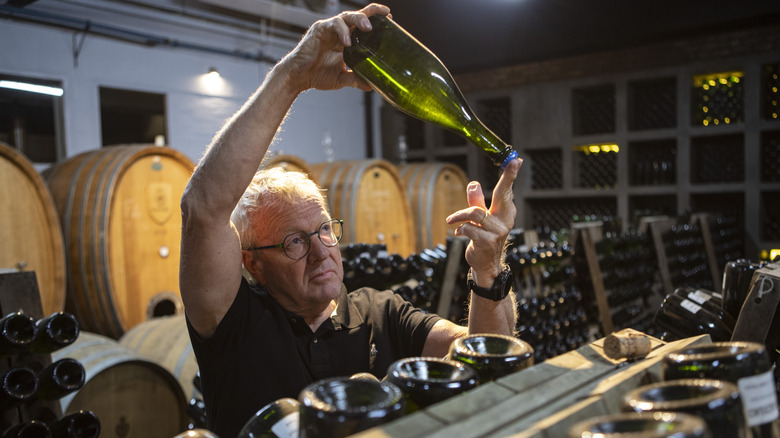This Is What Makes South African Wine So Unique
South Africa is experiencing a wine boom, and Americans have begun to notice. The country isn't new to winemaking (the Dutch planted the first vineyards back in the 17th century) but the 20th century was rocky terrain for the South African wine industry, and we are starting to see what happens when they're given more fertile conditions to work in. Although it will inevitably be an oversimplification, there are three main characteristics of South African wine that make it unique: geography, tradition, and market structure.
The geographical component is simultaneously the most important part and the easiest to understand. In viticultural terms, terroir is the name given to the flavor components that are derived from the farm's location. Soil conditions, climate, and other nearby plants affect the flavor of the grape to a surprising degree. A talented sommelier could sip a glass of wine and tell you if it was a drought year when the grapes were grown, for example. South Africa's geographical landscape enjoys a wide spectrum of climates and soil conditions, which means they have access to a wide variety of grapes.
Just east of Cape Town you have Stellenbosch (one of the most famous South African wine regions), which is warm and dry, perfect for big-bodied red wines like Cabernet Sauvignon and South Africa's very-own Pinotage. Further south are coastal wine regions like Walker Bay whose colder climate is well-suited for white wines like Chenin Blanc and Sauvignon Blanc. This is only a taste of what wines South Africa has to offer.
South Africa's winemakers are not restrained by tradition or market hegemony
Winemaking traditions are a huge point of pride for the places that enjoy them. Old World wine regions like Germany and France take their wines very seriously and for good reason. But there is a downside to this as well, which is that winemakers are often restrained by tradition. Winemakers are relegated to making the same wine the same way others have been doing for hundreds of years. This can boost consumer confidence but at the cost of creativity.
South African vineyards are not so restrained, and their lack of ancient tradition is ultimately a boon for the winemakers that are talented enough to take advantage of it. In the 20th century, this inexperience was not as beneficial since winemakers would often make mistakes. The story of Pinotage is a great example, though we don't have enough time here to give a full account of it. South Africa's creative ethos also helped create their sparkling wine Cap Classique, a delicious competitor to Champagne and prosecco.
Last but not least, we have the wine market's overall structure. In several other winemaking countries, the market is dominated by a small number of massive wine producers effectively monopolizing the region's resources. This can be beneficial for a country's brand recognition but detrimental to the creative potential we've been discussing. This feature of the industry likely won't last forever — all the more reason to grab some South African wine while it lasts.

